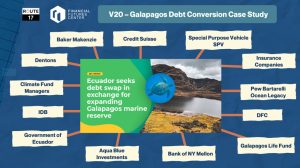The fiscal implications of managing climate transitions are significant, especially considering fossil fuels are a major source of revenue for many countries. Furthermore, the revenue raised from carbon pricing, which has proven to be politically difficult to enact, may be insufficient to finance or incentivize the low-carbon transition. This means the International Monetary Fund (IMF), with its mandate to maintain the stability of the international financial system, has a key role to play in helping countries innovate to improve domestic resource mobilization and access to quality external financing.
A new policy brief summarizes three technical papers from members of the Task Force on Climate, Development and the IMF on the fiscal implications of transitions to net zero due to the significant impacts on countries’ fiscal positions and implications for debt sustainability.
Researchers at the Centre for Social and Economic Progress provide an analysis of the revenue India is currently collecting from fossil fuel related taxes and duties, and how the transition will impact those revenue streams. Under all three scenarios, public revenue drops significantly from current levels. Notably, the study finds that policies such as carbon taxes or removal of fossil fuel subsidies would add less revenue than what is already being collected from other fossil fuel taxes and duties.
Next, a team of researchers at the United Nations Economic Commission for Latin America and the Caribbean highlights the fiscal challenges of six major hydrocarbon producers in Latin America and the Caribbean and the implications of a transition to net zero for revenue streams and debt sustainability. The study underlines the magnitude of the fiscal challenges ahead, especially as they deal with growing social and investment spending needs to achieve sustainable and inclusive development.
And Kevin P. Gallagher and Franco Maldonado from the Boston University Global Development Policy Center experiment with incorporating both physical climate risks as well as the fiscal needs for financing a green transition into the IMF’s framework for Debt Sustainability Analyses (DSAs) for two countries, Colombia and Peru. The authors attempt to incorporate the fiscal impacts of both physical and transition risks into current IMF models for DSAs. Under various scenarios, Colombia would push on debt thresholds, but Peru would not. The authors argue the IMF will have to accelerate its data analytic capacities to generate reliable estimates of the fiscal needs and impacts of climate change policy and climate change itself.
These technical papers deploy a variety of approaches that can help the IMF identify issues and methodologies, providing four key policy recommendations to advance its mandate and address the macro-critical aspects of a just transition to an inclusive, resilient net-zero economy.
Key policy recommendations:
- Re-evaluate ‘green fiscal consolidation’ measures, acknowledging the link of that approach to underdevelopment and low investment levels. Structural transformation towards a net-zero economy requires large levels of investment globally, at a time when many countries are already facing fiscal pressures.
- Expand country-specific data on resource mobilization needs, economic impacts of physical risk and the direct and indirect impacts of green investment in the economy for IMF reports and across its surveillance and advice toolkit. Climate risks and other related considerations were not contemplated when original IMF models were adopted, and these tools must be reflective of new needs.
- Help member states make a stepwise increase in investment for inclusive, resilient and low-carbon economies, particularly in carbon-intensive countries. Green public investments have large multiplier effects, and the IMF should experiment with building such multipliers into its analytic work and advising countries on how to identify and budget for green public investments.
- Tailor advice to support reforms that increase tax revenue and improve tax structure, favoring progressive tax instruments. This effort should be complemented by coordinated international measures, especially by multilateral lenders, to ensure countries have sufficient access to financing to undertake net-zero transitions and achieve sustainable development.




